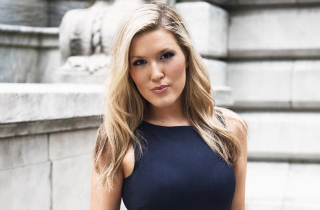The Olivia Nuzzi Comeback Is Everything Wrong With Modern Media

When news broke last September about Olivia Nuzzi’s alleged relationship with Robert F. Kennedy Jr., my first instinct—within minutes, actually—was sympathy. I sent her a DM: “You’ll get through this.” She responded with a heart.
(The fact that I’m opening a column about media narcissism with my own DM slide should tell you everything about how far gone we all are. But I promise this is going somewhere.)
I meant it. I’d known Nuzzi professionally for years—never close friends, but friendly enough through the White House Correspondents’ Dinner circuit and occasional professional courtesies. She’d always been generous with contacts and advice. More importantly, she was, without question, one of the best political writers of her generation.
She was sort of a modern-day political version of Hunter S. Thompson (gonza?), and her work had that rare quality of being simultaneously gossipy and intellectually serious—the perfect dinner party companion who could pivot seamlessly from Page Six intrigue to deep New Yorker policy deep dive.
That morning, my heart sank not because I knew the allegations were true — I was blissfully unaware of any sordid details — because I knew two talented people were about to be consumed by a media maelstrom. Whatever had happened, it was going to get ugly and deeply personal.
Now, a year later, as Nuzzi reemerges with her memoir American Canto, a new position at Vanity Fair, and a New York Times profile complete with black-and-white glamour shots on Malibu beaches, I find myself less concerned with litigating what happened between her and Robert F. Kennedy Jr.—whether it crossed lines, who’s telling the truth, whether ex-fiancé Ryan Lizza’s allegations about a pattern of behavior hold up.
What strikes me instead is how her comeback strategy makes perfect sense. Not morally, perhaps, but economically. Structurally. The glamour shots, the literary memoir, the Vanity Fair gig—none of it feels like tone-deaf narcissism anymore. It feels like someone who understood the game’s true rules and is playing them better than most.
Which leads me to the uncomfortable question: What happens when an industry spends 15 years telling talented young journalists that personal brand is currency, that access is the game, that being a character in the story makes better content—and then acts shocked when someone takes that logic a few degrees too far?
Here’s what we don’t say out loud: There’s no money in journalism anymore. No fame, no glamour, no prestige. But there’s lots and lots of money in media—in being a brand, an influencer, a personality. We stopped paying journalists and started rewarding performers.
Consider the origin story that Lizza now tells: A young Nuzzi in a relationship with ex-MSNBC blowhard Keith Olbermann, 34 years her senior, who allegedly paid for her college, bought her $15,000 in Cartier jewelry, and furnished her West Village apartment. Whether you find this distasteful or not, here’s what it taught her: Personal relationships with powerful media figures open doors. Access trading works. The line between personal and professional is negotiable if you’re charming and talented enough.
This isn’t Nuzzi being uniquely corrupt. This is her learning the actual rules of the game as digital media wrote them.
Because here’s the uncomfortable truth: Nuzzi was great at precisely what was incentivized. New York Magazine didn’t hire her despite her personality-driven, access-heavy approach—they hired her because of it. Her Trump access, her voice-forward writing, her ability to make herself part of the narrative, her social media savvy—that wasn’t a bug in the system. That was the entire business model.
We spent a decade-plus dismantling the institutional guardrails that once protected young journalists. Salaries plummeted. Job security evaporated. Newsroom mentorship disappeared. What replaced it? A ruthless attention economy where your Instagram and Twitter followers mattered far more than your editor’s guidance, where “personal brand” became the only portable asset in an industry of constant layoffs and collapses. We told a generation of talented writers: You’re not a reporter for an institution. You ARE the institution. Your access is your value. Your personality is your product.
And Olivia Nuzzi was brilliant at this game, which is why she succeeded.
The RFK Jr. situation—an intense emotional and digital relationship with a presidential candidate she was covering, during which she reportedly advised him on campaign crisis management—isn’t some inexplicable departure from journalistic norms. It’s the logical endpoint of a system that spent years rewarding access over adversarial reporting, personality over institutional credibility, and personal narrative over professional distance.
Which brings us to the comeback itself—the part that initially struck me as tone-deaf narcissism. The glamorous photo shoots, the Lana Del Rey cosplay with the white Mustang convertible on PCH, the literary ambiguity about Kennedy’s identity in her book, the defiant framing that positions her as a victim bearing witness to power.
But here’s what I’ve come to understand: This isn’t tone-deaf. It’s the only move that makes economic sense in 2025.
Nuzzi has correctly read our current media ecosystem. There is no path back to institutional credibility for her—those institutions are dying anyway, and they were never going to reward rule-following in the first place. But there IS a path forward through celebrity, through controversy, through the monetization of scandal itself.
The Vanity Fair job. The book deal. The rehabilitation tour that’s a Klieg light away from what it really wants to be. She’s not trying to rebuild her reputation as a journalist—she’s building a different kind of brand entirely, one where being interesting matters more than being ethical, where attention is the only currency that still spends.
The New York Times profile understandably does not feature Lizza’s Olbermann allegations. At the same time, Nuzzi herself offers only literary evasions and refuses to provide evidence for her counterclaims that Lizza hacked her devices. None of it matters. In our attention economy, ambiguity is an asset. Controversy is content. Every piece of criticism is also marketing.
The most revealing moment in the Times piece comes when Nuzzi compares herself to Eric Adams, saying of the mayor who allegedly sold out for business-class flights: “I destroyed mine for less.” It’s framed as self-aware humor, but it’s actually a confession that something fundamentally transactional occurred—she just doesn’t believe it matters anymore.
And maybe she’s right. Maybe in a media landscape where institutional authority has collapsed, where nobody trusts anything anyway, where personal brand is the only thing that survives platform collapse and industry implosion, Nuzzi is simply ahead of the curve.
But that doesn’t make me feel better. It makes me feel complicit.
I sent Nuzzi that DM because I genuinely felt bad for her. Now I realize I should have felt bad for all of us. The real scandal isn’t one journalist’s ethical compromises—it’s that we built a system where those compromises were inevitable, where they were actually incentivized, and where the only thing left to do is package them as content. She didn’t break journalism’s rules. She just followed them more literally than we were comfortable admitting we’d written them.
The question isn’t whether Olivia Nuzzi can come back from this. She already has. The question is whether the rest of us are ready to admit what her comeback reveals about what journalism has become—and whether we’re okay with that.
I’m still not sure I am.
This is an opinion piece. The views expressed in this article are those of just the author.
New: The Mediaite One-Sheet "Newsletter of Newsletters"
Your daily summary and analysis of what the many, many media newsletters are saying and reporting. Subscribe now!






Comments
↓ Scroll down for comments ↓